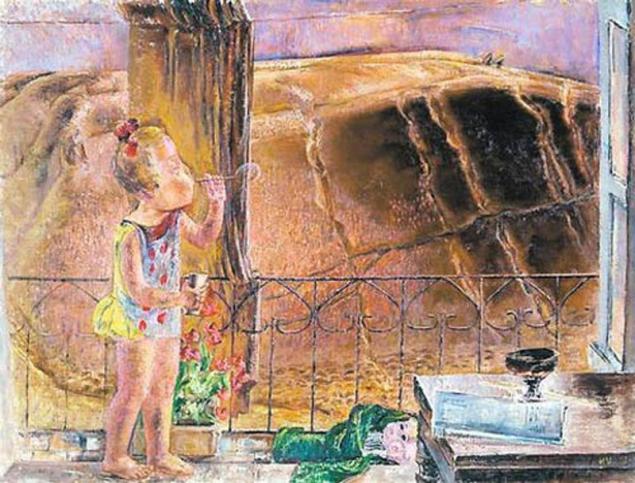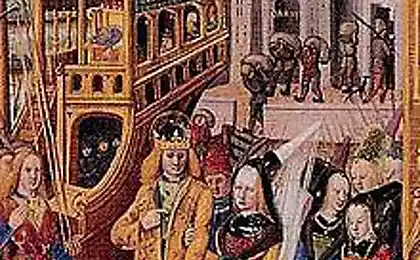423
Puer and Puella: the perpetual children among us
Puer aeternus (Latin — "eternal boy") is one of the Jungian archetypes: the child who refuses to grow up. For this archetype is inherent in the unwillingness to accept the responsibility inherent in adult age, a kind of persistent infantilism. He contrasted senex — "the eternal man".
Puerilely, as a personality, is the personal specificity that is determined by the internal content features of the regression on children's level of personal and psychological functioning. Analogy – infantilism, the Peter pan syndrome, the syndrome of the Little Prince, an English-language neologism kidalt (reduction from English. kid — kid and eng. adult — adult).

©Vera Nilsson
"Psychologically, attributable to an adult man whose emotional life remains at a children's or youth level, as a rule, due to the very strong dependence on the mother (for women, respectively, to the father). In the interpretation of the Jungian archetype of the "eternal" mythological child has a psychological sense of establishing indestructible some infantile traits in the psyche of an adult man". (CIT. according to Vladimir Zelensky)
The prevalence of the phenomenon of puerilely in recent decades clearly observed not only psychologists within their own work, but also by non-specialists, people who in life social and the personal are increasingly faced with people passport and physically adults, but really if it's not grown-up internally. This "bestcost" manifests itself in different areas of life (intimate relationship, professional activities, social interaction, etc.), and is characterized by several specific characteristics, complicating how relationships puerile with others, and his own satisfaction with life and themselves.
Because the increase in the number of people puerilely significantly correlated with the socio-cultural (and not only) processes within companies, which has developed to date, there is reason to predict it an increase in the percentage puerile in the next couple of decades, and the population growth among referrals to psychologists, psychotherapists.
PUER (male)
From the point of view of analytical psychology – a man with a pronounced mother complex (mother complex — a group of sensuously painted or tinted ideas ("the complex feelings of a certain tone," in the words of Jung) associated with the experience and image of mother).
Main features:
- long keeps adolescent psychology and a strong dependence on the mother;
- difficulties in social adaptation;
— a sense of superiority over others;
- life is like a "draft" like real life – the play that will be played once the infinite is not coming tomorrow, but in the infinitely repeated today – cyclically repeated rehearsal, where it is possible especially not to try;
- do not like responsibility and encumbrances;
- work as long as they are interested in the subject of activity;
- easy going, embracing change;
shadow aspect is cold and calculating rationalism;
the duality of nature.
"Identification with the Puer may result in to give a superficially charming, but essentially immature man-boy, unable to assume personal obligations or to build something, the kind of frivolous Little Prince with the false hopes and misplaced dreams. In this sense, PU'er is closely associated with the archetypal Mother, because, until he finds the right balance between dependence and autonomy from the Mother, identification with the Divine Child, Mama's pet, will be presented a very attractive way to escape from adult responsibility and the pain of separation, separation." (CIT. according to Vladimir Zelensky)
PUELLA (women)
This term is used to characterize the psychological types of women with a pronounced father complex (a group of affectively-toned ideas associated with the experience and image of the father).
Main features:
— the youthful enthusiasm that infects others with Puella;
spontaneous thinking, the ability to the production of a large number of original ideas;
— naive thinking about the everyday world, the impracticality of;
— pronounced idealism instead of realism;
— a sense of life as temporary and contingent, liability problems;
— "life on draft", the reluctance to choose;
— negative attitude to any borders, prohibitions;
— the process, potential more important than the result;
— the complexity of the autonomy of personal boundaries.
"People often ask me about the psychology puella aeterna and whether it exists at all. There is no doubt, as I see it. Puella aeterna would be a woman like "eternal daughter", the one who is unconsciously identified with anime father. She lives as a boy-Puer, archetypal role". (CIT. according to M. L. Von Franz)
Life puerile personality, regardless of gender, is filled with self-restraint, arising from the fear of being in a situation from which it will be difficult to get out. All plans for the future dissipate into the fantasies about what could and should be, but the imagination does not transform into real action to change the situation.
In the end, the fate puerile seldom develops on the scenario, which he himself predicts, and he will have to make some decisions associated with it, but not now...
Puer, Puella aspiring to independence, freedom, and react with irritation at the constraints of all kinds (including, often, them to God) and despise any borders or barriers in their path.
Common symptoms of puerility — "images of the prison and any restrictions of freedom: chains, chains, caves, bars, bolts, traps, corsets, bandages, etc., life Itself, reality perceived as a prison. These obstacles, barriers unconsciously associated with the free life in the free world of early childhood." (CIT. according to Vladimir Zelensky) published
Author: Margarita Novitskaya
P. S. And remember, only by changing their consumption — together we change the world! ©
Source: www.b17.ru/article/puerilnost/
Puerilely, as a personality, is the personal specificity that is determined by the internal content features of the regression on children's level of personal and psychological functioning. Analogy – infantilism, the Peter pan syndrome, the syndrome of the Little Prince, an English-language neologism kidalt (reduction from English. kid — kid and eng. adult — adult).

©Vera Nilsson
"Psychologically, attributable to an adult man whose emotional life remains at a children's or youth level, as a rule, due to the very strong dependence on the mother (for women, respectively, to the father). In the interpretation of the Jungian archetype of the "eternal" mythological child has a psychological sense of establishing indestructible some infantile traits in the psyche of an adult man". (CIT. according to Vladimir Zelensky)
The prevalence of the phenomenon of puerilely in recent decades clearly observed not only psychologists within their own work, but also by non-specialists, people who in life social and the personal are increasingly faced with people passport and physically adults, but really if it's not grown-up internally. This "bestcost" manifests itself in different areas of life (intimate relationship, professional activities, social interaction, etc.), and is characterized by several specific characteristics, complicating how relationships puerile with others, and his own satisfaction with life and themselves.
Because the increase in the number of people puerilely significantly correlated with the socio-cultural (and not only) processes within companies, which has developed to date, there is reason to predict it an increase in the percentage puerile in the next couple of decades, and the population growth among referrals to psychologists, psychotherapists.
PUER (male)
From the point of view of analytical psychology – a man with a pronounced mother complex (mother complex — a group of sensuously painted or tinted ideas ("the complex feelings of a certain tone," in the words of Jung) associated with the experience and image of mother).
Main features:
- long keeps adolescent psychology and a strong dependence on the mother;
- difficulties in social adaptation;
— a sense of superiority over others;
- life is like a "draft" like real life – the play that will be played once the infinite is not coming tomorrow, but in the infinitely repeated today – cyclically repeated rehearsal, where it is possible especially not to try;
- do not like responsibility and encumbrances;
- work as long as they are interested in the subject of activity;
- easy going, embracing change;
shadow aspect is cold and calculating rationalism;
the duality of nature.
"Identification with the Puer may result in to give a superficially charming, but essentially immature man-boy, unable to assume personal obligations or to build something, the kind of frivolous Little Prince with the false hopes and misplaced dreams. In this sense, PU'er is closely associated with the archetypal Mother, because, until he finds the right balance between dependence and autonomy from the Mother, identification with the Divine Child, Mama's pet, will be presented a very attractive way to escape from adult responsibility and the pain of separation, separation." (CIT. according to Vladimir Zelensky)
PUELLA (women)
This term is used to characterize the psychological types of women with a pronounced father complex (a group of affectively-toned ideas associated with the experience and image of the father).
Main features:
— the youthful enthusiasm that infects others with Puella;
spontaneous thinking, the ability to the production of a large number of original ideas;
— naive thinking about the everyday world, the impracticality of;
— pronounced idealism instead of realism;
— a sense of life as temporary and contingent, liability problems;
— "life on draft", the reluctance to choose;
— negative attitude to any borders, prohibitions;
— the process, potential more important than the result;
— the complexity of the autonomy of personal boundaries.
"People often ask me about the psychology puella aeterna and whether it exists at all. There is no doubt, as I see it. Puella aeterna would be a woman like "eternal daughter", the one who is unconsciously identified with anime father. She lives as a boy-Puer, archetypal role". (CIT. according to M. L. Von Franz)
Life puerile personality, regardless of gender, is filled with self-restraint, arising from the fear of being in a situation from which it will be difficult to get out. All plans for the future dissipate into the fantasies about what could and should be, but the imagination does not transform into real action to change the situation.
In the end, the fate puerile seldom develops on the scenario, which he himself predicts, and he will have to make some decisions associated with it, but not now...
Puer, Puella aspiring to independence, freedom, and react with irritation at the constraints of all kinds (including, often, them to God) and despise any borders or barriers in their path.
Common symptoms of puerility — "images of the prison and any restrictions of freedom: chains, chains, caves, bars, bolts, traps, corsets, bandages, etc., life Itself, reality perceived as a prison. These obstacles, barriers unconsciously associated with the free life in the free world of early childhood." (CIT. according to Vladimir Zelensky) published
Author: Margarita Novitskaya
P. S. And remember, only by changing their consumption — together we change the world! ©
Source: www.b17.ru/article/puerilnost/























